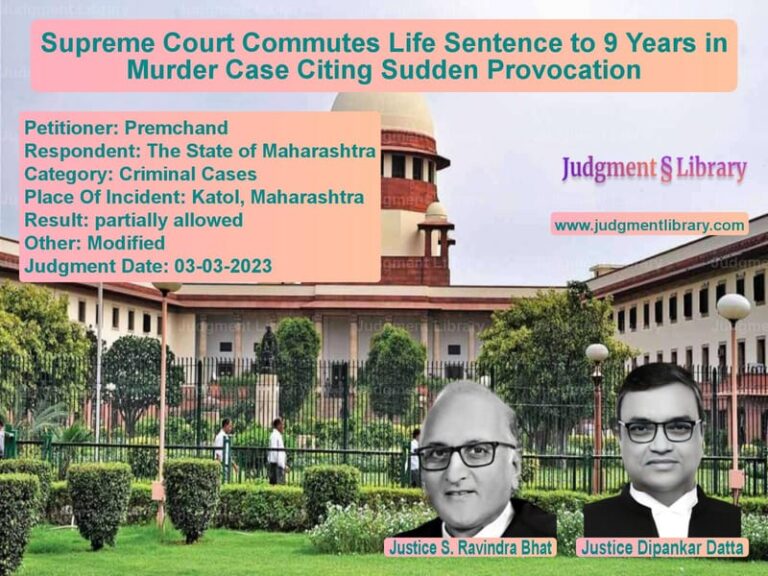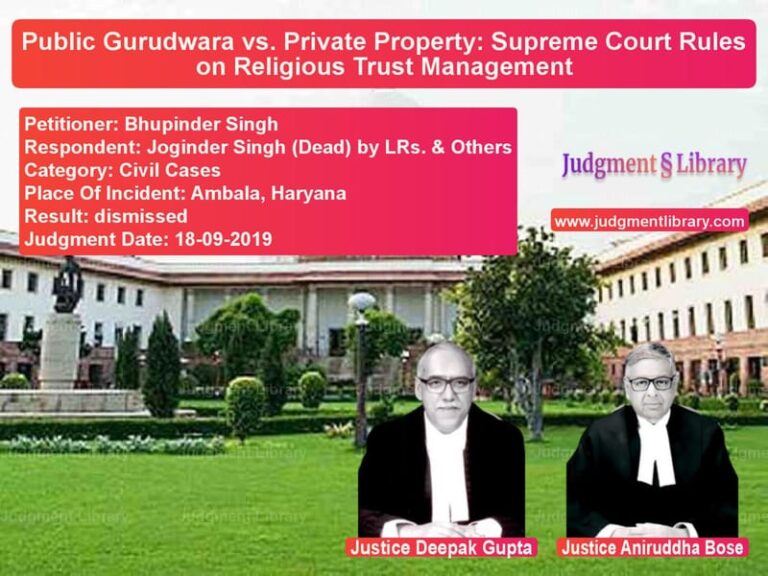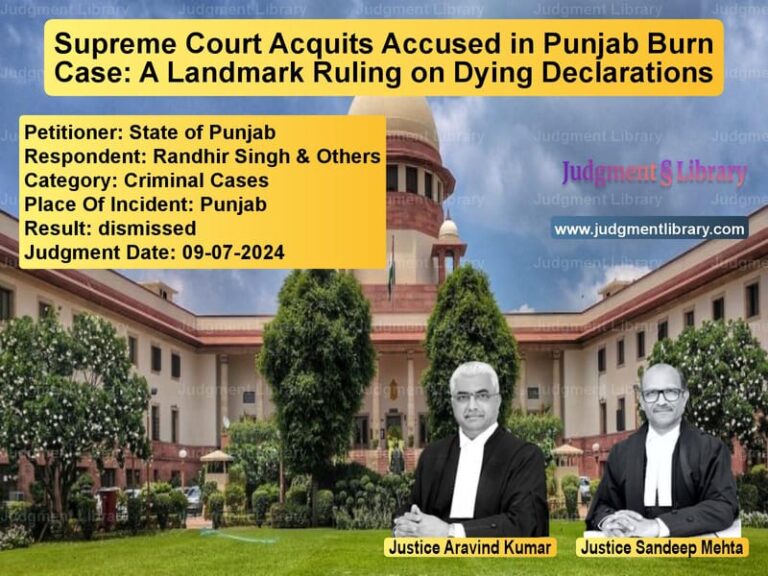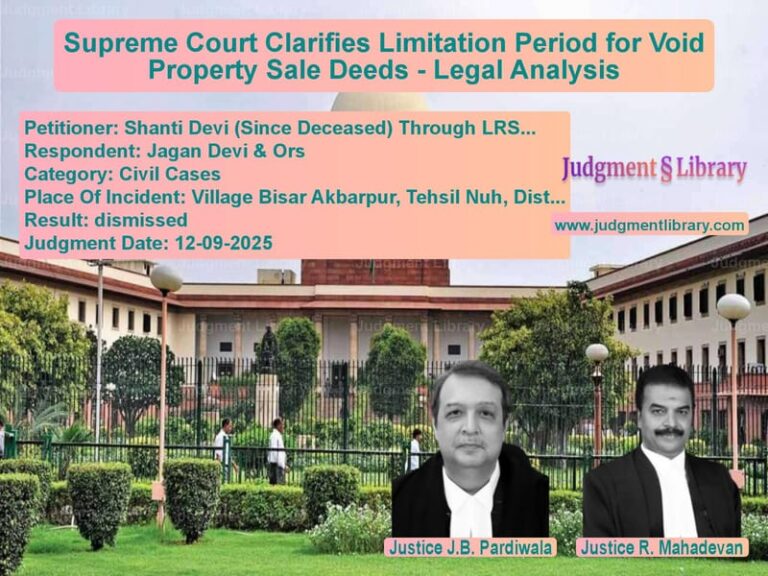Supreme Court Acquits Man in 1989 Murder Case Due to Lack of Evidence
The Supreme Court of India has overturned the conviction of Karakkattu Muhammed Basheer in a 1989 murder case, citing significant gaps in the prosecution’s case. The ruling sets a precedent for cases based on circumstantial evidence, emphasizing the need for a complete chain of events leading to an inescapable conclusion of guilt.
Background of the Case
The case involved the murder of a woman named Gouri, whose body was discovered in a paddy field on the morning of August 17, 1989. The prosecution alleged that the appellant, Karakkattu Muhammed Basheer, murdered Gouri at the house of Accused No. 2, with whom he allegedly had an illicit relationship.
The trial court convicted Basheer under Section 302 (murder) and Section 201 (causing disappearance of evidence) of the Indian Penal Code (IPC), sentencing him to life imprisonment and seven years of rigorous imprisonment, respectively. Accused No. 2 was found guilty under Section 201 IPC and sentenced to four years of rigorous imprisonment. The High Court of Kerala upheld the convictions, leading to the present appeal before the Supreme Court.
Key Legal Issues
- Whether the circumstantial evidence presented by the prosecution established an unbroken chain of events proving the appellant’s guilt beyond a reasonable doubt.
- Whether the prosecution sufficiently proved the motive for the crime.
- Whether the alleged discovery of the murder weapon and blood-stained clothes could be relied upon.
Prosecution’s Arguments
- Gouri was last seen at the house of Accused No. 2 on the night of August 16, 1989.
- The appellant and Accused No. 2 had an illicit relationship, which was the motive for the murder.
- The appellant was allegedly seen leaving Accused No. 2’s house late at night.
- Blood-stained clothes and a coconut scraper, suspected to be the murder weapon, were recovered based on the appellant’s disclosure.
Defense’s Arguments
- The case was entirely based on circumstantial evidence, with no direct witnesses to the crime.
- The prosecution failed to establish a motive strong enough to justify murder.
- The discovery of the murder weapon and clothes was unreliable as the witnesses to the recovery contradicted themselves.
- The last-seen theory was weak as the witnesses who saw Gouri last stated that she had left Accused No. 2’s house at 9:00 PM.
Supreme Court’s Observations
On Circumstantial Evidence
The Supreme Court reiterated the principles laid down in Ramreddy Rajesh Khanna Reddy v. State of A.P. and State of U.P. v. Satish, emphasizing that in cases based on circumstantial evidence:
- The prosecution must establish all pieces of incriminating evidence through reliable and clinching evidence.
- The circumstances must form a complete chain leading only to the guilt of the accused.
- Suspicion, however grave, cannot substitute proof.
On the Last-Seen Theory
The Court noted that the deceased was last seen at Accused No. 2’s house at 9:00 PM on August 16, 1989. The prosecution claimed that the appellant arrived at 11:30 PM, but this did not prove that he and the deceased were present at the same time. The Court observed:
“The last-seen theory applies only when the time gap between the deceased being last seen and their death is so small that no other hypothesis is possible.”
On the Recovery of Evidence
The Court found that the recovery of the coconut scraper and blood-stained clothes was unreliable. Witnesses to the recovery contradicted themselves, with one stating that the bag containing the items was taken by the police days before the alleged discovery. The Court held:
“When there is a missing link in the chain of evidence, a conviction cannot be recorded based on such material.”
Final Judgment
The Supreme Court set aside the convictions and ordered the immediate release of the appellant. The Court concluded:
“The prosecution has failed to establish an unbroken chain of evidence. The gaps in the case create reasonable doubt, and the benefit of doubt must be given to the accused.”
Implications of the Judgment
- Reaffirms the importance of proving circumstantial evidence with a complete and logical sequence of events.
- Emphasizes that last-seen evidence must be supported by additional proof.
- Strengthens safeguards against wrongful convictions based on weak forensic recovery.
This ruling reinforces that courts must exercise caution in cases based entirely on circumstantial evidence, ensuring that every link in the evidentiary chain is strong enough to support a conviction.
Petitioner Name: Karakkattu Muhammed Basheer.Respondent Name: The State of Kerala.Judgment By: Justice Abhay S. Oka, Justice Augustine George Masih.Place Of Incident: Kerala.Judgment Date: 05-11-2024.
Don’t miss out on the full details! Download the complete judgment in PDF format below and gain valuable insights instantly!
Download Judgment: karakkattu-muhammed-vs-the-state-of-kerala-supreme-court-of-india-judgment-dated-05-11-2024.pdf
Directly Download Judgment: Directly download this Judgment
See all petitions in Murder Cases
See all petitions in Bail and Anticipatory Bail
See all petitions in Custodial Deaths and Police Misconduct
See all petitions in Criminal Defamation
See all petitions in Extortion and Blackmail
See all petitions in Judgment by Abhay S. Oka
See all petitions in Judgment by Augustine George Masih
See all petitions in allowed
See all petitions in Quashed
See all petitions in supreme court of India judgments November 2024
See all petitions in 2024 judgments
See all posts in Criminal Cases Category
See all allowed petitions in Criminal Cases Category
See all Dismissed petitions in Criminal Cases Category
See all partially allowed petitions in Criminal Cases Category







